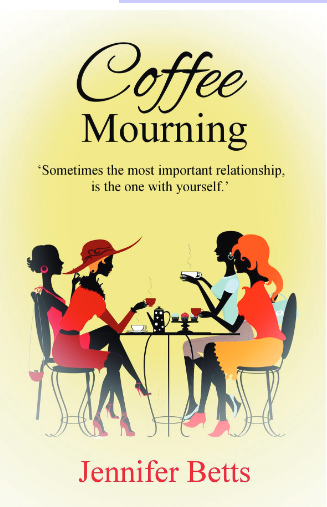
Eoin Meegan
Coffee Mourning is the first novel by Jennifer Betts. What started off as a short story, and lay gathering dust for some time, eventually evolved to a tale that simply had to be told. However, like many first time authors Jennifer experienced her fair share of rejections, but perseverance paid off and she didn’t give up until she found the perfect publisher in Blossom Spring. And as all book enthusiasts know J K Rowling’s first Harry Potter book came up against something like twelve rejections before it was finally accepted – and look how successful it became!
Jennifer told NewsFour the book started out as a kind of therapy – the best ones all do! and soon she started seeing the characters in her head. From there it just kept growing and growing until it emerged fully formed.
Not your average plot, Coffee Mourning explores the dynamic around a group of diverse women, strangers, and from different backgrounds, who happen to meet up for weekly coffee mornings. Friendships begin, tentatively at first, but which blossom as we get further inside the pages.
The book’s protagonist is Mary, the instigator of the aforementioned coffee morning meets. Mary is married to Frank, and at the novel’s opening we are told they’re going through a bumpy patch, a kind of crisis in their marriage, and have decided to take a break. They don’t get divorced however, because that would make Mary feel too guilty, and they still meet up occasionally. The couple have three children, including Helen who cares deeply for them both and worries since they’ve split up.
Mary is a strong woman, coming from a place where she feels she has less independence than she’s like, gradually to one of strength. She is experiencing something of a hiatus in her life, always seeming to feel, quite unnecessarily as it happens, that she doesn’t quite come up to scratch. Thus her big coffee idea is something of a reaction against the vacancy in her life. After a few rounds of superficial testing of the group water, the ice breaks and a beautiful intimacy unfolds amongst the ladies. A meeting of hearts and minds.
There are six women in all in the coffee group, including Mary. Cathy, a former model, feels somewhat intimidated by the happily married others, who are all in turn intimidated by her! She is very glamorous and argues all the time with her husband. In many ways the group rescue Cathy from her own superficiality, because the years, and too many glasses of Pinot Grigio I suspect, have deluded her into buying into her own shallow stereotype, and she has forgotten what a really decent person she is deep down.
Then there is the timid but loveable Alice, trying desperately to get pregnant and feeling tearful every time she sees another woman pushing anything resembling a pram. She could best be described as ditzy but endearing. No one would be intimidated by Alice, but all the same Mary is slightly jealous of her, because she has something the rest of them don’t- a really happy marriage to the good hearted and affable Stephen. Alice is the youngest in the group; we’re told she never heard of Fig Rolls. How can she have lived?
Next we meet Rosa, a Polish lady who is in an abusive relationship. She is a stay-at-home mum whose English is not very good, and tries very hard to keep her domestic situation a secret from the other ladies as long as she can. Rosa provides an edginess to the story as we’re not quite sure if blood will spill, and how much, just around the next corner. On the other end of the spectrum is the independently minded Marj, who lives alone with her best friend, her cat Jeepers. Marj is in her early 50s, and Mary instantly likes her. In an interesting twist halfway through the book Marj decides to put an ad on an online lonely hearts site. Someone called J responds. What evolves is a surprising and tender revelation.
The group is completed by retired schoolteacher Brigid, who reminds Mary of her own mum and imbues maternal wisdom on the others. Brigid was inspired by a woman Jennifer met on a creative writing course. At first I couldn’t understand why Mary was so reluctant to tell everyone, including her own family, that she had started the coffee morning, but as the book progresses this becomes obvious.
Soon the formal gatherings turn into more social and friendly occasions. This begins with a night out in the local, and graduates to a weekend in Amsterdam where all kinds of shenanigans take place, including sampling a delicacy known as ‘space cake’ (something this writer would know nothing about!) It is delightful to see how the ladies grow in themselves, and in the company of each other, as they gradually learn to trust, and open themselves to one another. Of course they are all carrying secrets, but as soon as they learn the others are too their own become less burdensome. In fact, all the girls believe the other members of the group are happy, and that they’re the only ones not. Deep down we soon learn they are all lonely and the coffee morning for each of them really is a mourning for some elusive thing which they believe they’ve lost, or never had.
On page 259 Brigid tells Mary:
“My dear, this is what happens when you bring a group of strong characters together, each playing their role, they’ve been comfortable starring in their own movies for the best part of their lives and now they’re being challenged, taken out of their comfort zone.”
Jennifer says what she would like most for people to take away from the book is to say, “if they [the ladies] had the courage to do it, maybe I can too.”
It is a tribute to the talent of Jennifer Betts that the warmth and genuineness of the ladies permeates down and you find yourself actually concerned as to what’s going on in their lives; and that extends to secondary characters, such as Frank, Mary’s husband. Frank is a solid man who always looked after his family and genuinely cares about them, but like so many men – particularly of a certain generation – fears deep down that he may be inadequate, and that he somehow let them down. Frank tries to smother those feelings in alcohol and bitter regrets. His meeting with Helen in Herbert Park is touching.
The author tells us on the first page that the story was inspired by her own parents, but she is at pains to tell me it is not “about them.”
Coffee Mourning is a heartwarming book that steers clear from ‘chick-Lit’ and cannot be easily pigeon-holed. It’s predominantly about characters more than plot; people who seem to live and breathe, so much so that when you come to the last page you genuinely feel sorry to have to leave them behind and know you will miss their company. A well crafted and masterful first novel.
Coffee Mourning by Jennifer Betts is published by Blossom Spring Publishing, Manchester, 2021, and is available on Amazon.co.uk
Images: book cover / the author



